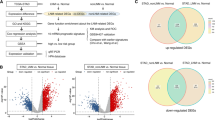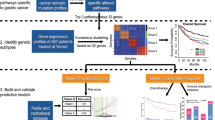Abstract
Lymphovascular invasion (LVI) in gastric cancer is readily demonstrated pre-operatively by mucosal biopsy during endoscopy, which can also provide samples for gene expression profiling. We have examined gene expression associated with lymphovascular invasion in a cohort of gastric cancer patients and have developed a 28-gene predictor of tumor aggressiveness for forecasting risk of node positivity (N+), which could potentially be useful pre-operatively. The resulting model’s ranking of increasing tumor aggressiveness correlated positively with N+ status, reaching statistical significance, and was three times the correlation of LVI with N+ status.



Similar content being viewed by others
References
Botwell D, Sambrook J (eds) (2003) DNA microarrays: a cloning manual. Cold Spring Harbour Laboratory Pr, Cold Spring Harbour, NY
Dicken BJ, Saunders LD, Jhangri GS et al (2004) Gastric cancer: establishing predictors of biologic behavior with use of population-based data. Ann Surg Oncol 11(6):629–635
Dicken BJ, Bigam DL, Cass C et al (2005) Gastric adenocarcinoma: review and considerations for future directions. Ann Surg 241(1):27–39
Dicken BJ, Graham K, Hamilton SM et al (2006) Lymphovascular invasion is associated with poor survival in gastric cancer: an application of gene-expression and tissue array techniques. Ann Surg 243:64–73
Golub TR, Slonim DK, Tamayo P et al (1999) Molecular classification of cancer: class discovery and class prediction by gene expression monitoring. Science 286:531–537
Karpeh MS, Brennan MF (1998) Gastric carcinoma. Ann Surg Oncol 5:650–656
Karpeh MS, Leon L, Klimstra D et al (2000) Lymph node staging in gastric cancer: is location more important than number? An analysis of 1, 038 patients. Ann Surg 232(3):362–371
Khan J, Wei JS, Ringnér M et al (2001) Classification and diagnostic prediction of cancers using gene expression profiling and artificial neural networks. Nat Med 7(6):673–679
Kirkpatrick P (2002) Look into the future. Nat Rev Drug Discov 1(5):334
Korenberg MJ (1991) Parallel cascade identification and kernel estimation for nonlinear systems. Ann Biomed Eng 19:429–455
Korenberg MJ (2002) Prediction of treatment response using gene expression profiles. J Proteome Res 1:55–61
Korenberg MJ (2003) Gene expression monitoring accurately predicts medulloblastoma positive and negative clinical outcomes. FEBS Lett 533:110–114
Korenberg MJ (2004) On predicting medulloblastoma metastasis by gene expression profiling. J Proteome Res 3:91–96
Listgarten J, Graham K, Damaraju S et al (2003) Clinically validated benchmarking of normalisation. Appl Bioinformatics 2(4):219–228
Lowry R (2007) Concepts and Applications of Inferential Statistics. Poughkeepsie, NY: Vassar College. http://faculty.vassar.edu/lowry/webtext.html
MacCallum RC, Zhang S, Preacher KJ, Rucker DD (2002) On the practice of dichotomization of quantitative variables. Psychol Methods 7:19–40
MacDonald TJ, Brown KM, LaFleur B et al. (2001) Expression profiling of medulloblastoma: PDGFRA and the RAS/MAPK pathway as therapeutic targets for metastatic disease. Nature Genet 29:143–152. Datasets: http://pepr.cnmcresearch.org/browse.do?action=list_prj_exp&projectId=63
von Rahden BH, Stein HJ, Feith M et al (2005) Lymphatic vessel invasion as a prognostic factor in patients with primary resected adenocarcinomas of the esophagogastric junction. J Clin Oncol 23(4):874–879
Wang Y, Jatkoe T, Zhang Y et al (2004) Gene expression profiles and molecular markers to predict recurrence of Dukes’ B colon cancer. J Clin Oncol 22(9):1564–1571
Weiss MM, Kuipers EJ, Postma C et al (2003) Genomic profiling of gastric cancer predicts lymph node status and survival. Oncogene 22(12):1872–1879
Weiss MM, Kuipers EJ, Postma C et al (2004) Genomic alterations in primary gastric adenocarcinomas correlate with clinicopathological characteristics and survival. Cell Oncol 26(5–6):307–317
Acknowledgments
CEC is Canada Research Chair in Oncology. Funding support to the PolyomX Program was provided by the Alberta Cancer Foundation and the Alberta Cancer Board and through the Clinical Investigator Program of the Royal College of Physicians and Surgeons of Canada and the University of Alberta Hospital Foundation to BJD.
Author information
Authors and Affiliations
Corresponding author
Rights and permissions
About this article
Cite this article
Korenberg, M.J., Dicken, B.J., Damaraju, S. et al. Predicting node positivity in gastric cancer from gene expression profiles. Biotechnol Lett 31, 1381–1388 (2009). https://doi.org/10.1007/s10529-009-0035-0
Received:
Accepted:
Published:
Issue Date:
DOI: https://doi.org/10.1007/s10529-009-0035-0




